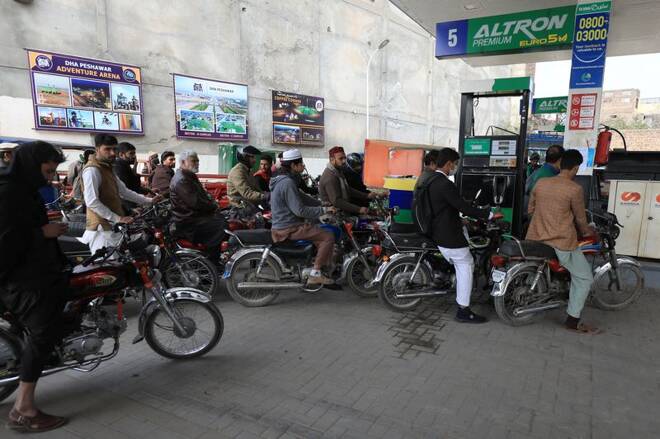Advertisement
Advertisement
Pakistani minister says fuel supplies adequate, warns against hoarding
By:
By Ariba Shahid KARACHI, Pakistan (Reuters) - Pakistan's government said on Wednesday it was not planning to hike fuel prices and warned oil companies against stockpiling petrol after some consumers complained they had been unable to purchase fuel at pumps.
By Ariba Shahid
KARACHI, Pakistan (Reuters) – Pakistan’s government said on Wednesday it was not planning to hike fuel prices and warned oil companies against stockpiling petrol after some consumers complained they had been unable to purchase fuel at pumps.
Minister of State for Petroleum Musadik Malik told reporters the country had enough fuel to last at least 20 days, in line with regulatory requirements, and any consumer shortages were due to stockpiling by oil marketing companies.
“I am requesting and warning companies… their licences will be taken away,” the minister said.
A member of Oil Companies Advisory Council (OCAC) in Pakistan told Reuters that only a few of the licensed companies are selling fuel while the others are not either due to financial issues or due to hoarding.
He added that while the petroleum ministry is helping process letters of credits to import fuels, the country’s low foreign exchange reserves and artificial curbs remain a hindrance.
Some consumers in Pakistan’s most populous province of Punjab reported petrol stations were closed and others were limiting the amount people could buy.
Ali Malik, a businessman and Punjab resident, said he visited the cities of Sialkot, Wazirabad and Lahore in the last few days where he had struggled to fill up his vehicle.
“I went to Sialkot where I found the majority of petrol stations closed. When I saw a functioning fuel station, I could not get more than eight litres,” he said, adding he had experienced similar issues in other cities.
Cash-strapped Pakistan is currently negotiating a programme with the International Monetary Fund and raised fuel prices by 15% prior last month, shortly before talks with an IMF delegation visiting Islamabad.
The South Asian nation — where inflation is running at a multi-decade high of 27.6% — is facing a balance of payments crisis and the plummeting value of the Pakistani rupee is pushing up the price of imported goods.
Abdul Sami Khan, the chairman of Pakistan Petroleum Dealers Association, said that the shortage is not from the dealers and said they had not received enough supply from oil marketing companies.
“Consumers think we’re not giving them fuel and they blame us – but we aren’t being supplied enough,” he said.
(Reporting by Ariba Shahid in Karachi and Asif Shahzad in Islamabad; Additional reporting by Mubasher Bukhari in Lahore)
About the Author
Reuterscontributor
Reuters, the news and media division of Thomson Reuters, is the world’s largest international multimedia news provider reaching more than one billion people every day. Reuters provides trusted business, financial, national, and international news to professionals via Thomson Reuters desktops, the world's media organizations, and directly to consumers at Reuters.com and via Reuters TV. Learn more about Thomson Reuters products:
Advertisement
